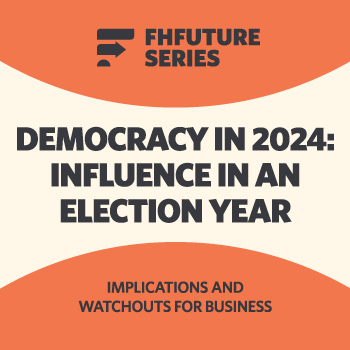The 2015 General Election: Fundamental Implications for PA Consultancies and In-House Teams
Nick Williams, Senior Partner and Head of Public Affairs, FleishmanHillard London
The result of the May 7th General Election will bring a new Government, and with it significant challenges for anyone involved in public affairs, consultancy-based or in-house. Despite the fact public affairs changed long ago from simple lobbying to communications based upon strategic insight and engagement across multiple channels and platforms, an accurate view of stakeholder engagement remains key to the success of any campaign. In this light, the importance of Parliamentary backbenchers has, on average, been less effective as a mechanism to change Government policy. The next Parliament looks set to turn this assumption on its head.
Current opinion polls are yet to shift significantly, and so it seems likely that the May General Election will deliver another coalition Government, and probably one that also relies upon other parties in confidence and supply arrangements. Unlike the 2010-2015 Parliament, any new Government is likely to, at best, rely on a small Parliamentary majority. Government by coalition we have got used to; working with small majority, or even minority, government has not been seen for over 20 years.
This will have fundamental implications for public affairs professionals. A small Parliamentary majority, or a minority administration, means that backbench MPs will have greatly increased influence with the executive. Governments stand or fall on their ability to win votes on key pieces of legislation. The realpolitik of this situation is that significant power will shift from Whitehall to Westminster, and we will see the greatest shift of influence to backbenchers for two decades.
With a Government reliant on the agreement of every single backbencher within their own party to survive, a business or organisation that seeks to influence Government policy will have new and influential routes to communicate with Ministers.
The implications of this are clear. Public Affairs agencies and in-house Government Relations Directors will want to refocus their priorities by:
- placing much greater emphasis on engaging backbench MPs from an early stage in the new Parliament;
- identifying “political champions” for your business or cause;
- ensuring that these relationships are maintained and developed over the whole Parliament;
- developing relationships with the traditionally smaller parties who may be part of a coalition, or whose voices will be heard far more in the new Parliament. The latter will definitely include the SNP, who will provide a distinctive voice in the new Parliament.
We have not seen a small Government majority since John Major’s 1992-1997 administration. And that was when the two-Party dominance was in full swing.
We will see a much more complex political make-up post 7th May. Public Affairs agencies and consultancies will need to rise to the new challenges and opportunities posed by a new Government, and ensure that they are offering their clients not only expertise in Parliamentary procedure, but also greater insight into backbencher sentiment and party political blocs.
Under the large majorities of the last four elections, Governments have been able to endure large backbench rebellions without fear of failure. That won’t be the case for whoever leads the 2015-2020 Government. This new Parliament will offer new opportunities for engagement -opportunities that should be grasped by agencies and businesses alike.
Find Out More
-
Democracy in 2024: Influence in an election year
May 2, 2024
-
Platinum CMS Award
March 13, 2024


